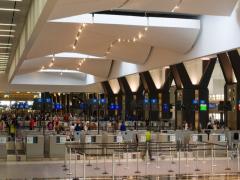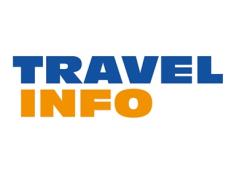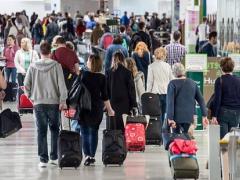THE ITC sector of the travel
industry is thriving, with
an increasing number of
consortiums entering the
market. For prospective
ITCs wanting to join the
independent travel market,
the plethora of choice can be
quite daunting. TNW spoke
to industry leaders to find
out which technology ITC
candidates should look for
in a consortium to ensure
their needs will be taken care
of and that they maintain a
competitive edge.
1. End-to-end solutions
Claude Vankeirsbilck, says
it is important to have
technology at your fingertips
that has been developed with
the corporate customer, the
traveller, the travel booker
and the travel consultant in
mind. He adds that Tourvest
has recently developed a total
end-to-end travel management
solution, TravelIT. “The need to
integrate mobile technology in
our value propositions is being
driven by the customer and it
is very important for the travel
trade to meet this need.”
2. Easy access to
content
Wally Gaynor says it is
important for travel agents to
be able to publish content on
their own websites or apps.
That is why Club Travel has
developed a ‘next generation’
Intranet system that allows
ITCs and affiliate agents to do
a single search for both LCCs
and scheduled carriers on the
system. He says the system
will support Galileo, Amadeus,
Worldspan and Sabre and
adds that, on the hotel side,
travel agents will be able to do
a single search accessing over
90 suppliers, including GTA,
Expedia, Travelport Rooms and
More. ITCs will also be able
to access car hire, transfers,
attractions and packages.
3. Bespoke package
design
For Travel Counsellors, it is
important that the technology
it offers is designed with the
travel agent in mind. Travel
Counsellors’ own dedicated
tour operating system, Phenix,
is one such system and
allows ITCs to design holidays
for their clients. The system
offers accommodation options,
flights, transfers, excursions
and even LCC options.
The company decided to
build its own tour operator
system as a result of global
changes, which saw tour
operators cutting out agents,
says Kirsten Hughes, Travel
Counsellors’ commercial
director. She says travel
agents who design their own
packages for their clients are
able to significantly increase
their margins.
Mladen Lukic, gm of Travel
Counsellors in SA, says
although most consortiums
outsource technology, he
feels it is important to make
it an internal competence.
“We’re the only company
to truly invest in our Travel
Counsellors’ businesses.”
4. Solid support
Prospective ITCs should not
just be wowed by flashy apps,
but should look for a company
with a solid backing that has
stood the test of time in a
very competitive environment,
says Andrew Stark. “They also
need to look for a company
which has the best deals in
the market because no matter
how good your technology is, if
your deals are not relevant or
not very competitive, you will
not have demand.”
Connectivity remains
a challenge
IN SOUTH Africa, there are
still barriers to overcome
before mobile can become a
key channel for travel-related
research and purchases,
says Melissa Storey. These
include the high costs of
mobile data, lack of WiFi and
3G/4G coverage in some
areas – specifically rural – as
well as users’ reluctance to
embrace new technology,
especially when it comes to
their data security concerns
regarding mobile payment
systems. “In addition, mobile
app and responsive website
sophistication is still lagging,
resulting in users losing faith
in the mobile product due
to a ‘bad’ experience with
outdated technology,” Melissa
adds.
However, mobile phone
usage is increasing and
will continue to do so. The
South African Mobile Report
published in 2014 by IAB
South Africa, which addresses
smartphone usage, showed
that most South Africans
(80%) use their smartphones
to access the Internet.
Separate research by World
Wide Worx shows that the
app has become the single
most significant tool driving
the mobile economy in South
Africa – the use of mobile
apps has increased from
24% of adult cellphone
users in mid-2012 to 43%
in late 2013.
First Car Rental enhances
online booking
FIRST Car Rental has
recently developed and
launched a responsive
website that will make
booking a car simpler and
faster across all platforms
for all its leisure and
corporate customers.
Melissa Storey says
travel agents will soon
be able to join in the
experience as First Car
Rental has adapted the
same approach to its
Weblink booking tool.
The website, and soon
Weblink, automatically
adjusts to fit any screen
size – whether mobile
phone, tablet or desktop
PC. “The website and
Weblink form part of First
Car Rental’s commitment
to provide customers
with a simple, fast and
streamlined process that
integrates seamlessly
across all channels –
whether that’s on the
phone, in branch, via
laptop or from a mobile
device.”
Designing your
own website?
own website?
DIGITALTRIP has a wide range
of innovations for 2015 that
can provide travel agents
building their own websites
with a definite edge over their
competitors.
Giles Clinton, Digitaltrip
sales agent for Africa, says
agents can give their website
the ‘wow’ factor with the new
interactive Metro Grid. They
can choose from three web
layouts, then simply add text
and images and link it to their
pages and special offers.
Digitaltrip now also allows
simplified searches with
a new search box that
gives customers a simple
way to search for flights,
accommodation, car hire,
transfers, attractions and
more. “Travel agents have
full control of the tabs,
which can be styled using
the site branding tool. They
can personalise their search
box even further with default
origin, location, date and trip
duration or they can use their
own custom lists,” says Giles.
Improving the traveller experience
WHAT is driving growth
in travel? This was a key
question posed at Sabre’s
Technology and Innovation
Celebration held on
June 8 at the company’s
new offices in Fourways.
The conversation
focused on the trend
towards consumerisation
and how this is strongly
linked to the proliferation
of mobile. Sabre’s Harald
Eisenacher, pointed out
that mobile enabled a
more personalised travel
experience – increasingly
in demand from travellers
– as is evidenced by the
fact that ancillaries are
a US$49bn (R607bn)
industry. “Mobile
personalises travel and
therefore helps drive
revenue.”
He also raised the
topic of big data,
commenting that through
the combination of
both structured and
unstructured data, travel
suppliers would be able
to predict the demand of
consumers. “Travellers
produce three times as
much data as the next
person.”
Technological
innovations such as
geolocation services, big
data and virtual reality
are all tools that the
travel industry will soon
be able to use to upsell
more effectively and at
the same time improve
the traveller experience.
In fact, Sabre provided
guests with a sneak
preview of some of its
new technologies that are
under development.
The technology works
on the premise of offering
a product or upgrade to
the traveller at that point
during their travels when
they are most likely to
need it. For example, a
businessman who, prior
to his flight opted for the
cheaper economy-class
ticket, might very well
regret his choice as his
journey begins and he
finds himself in a very
cramped and noisy space
with a screaming child in
the row in front of him.
At this point a message
pops up on his mobile,
offering him a last chance
to upgrade.
Another example would
be a passenger en route
to the airport, where there
is a lengthy queue at
the check-in. The airline,
noting the possible
delay, will be able to
send a message to the
passenger warning them
of the hold-up and offer a
fast-track pass.
These emerging
technologies will help
travel professionals
to take advantage of
the growing number of
smartphone users –
Sabre estimates this is
growing at one million
new users every day and
caters more effectively
to the next generation of
travellers.












